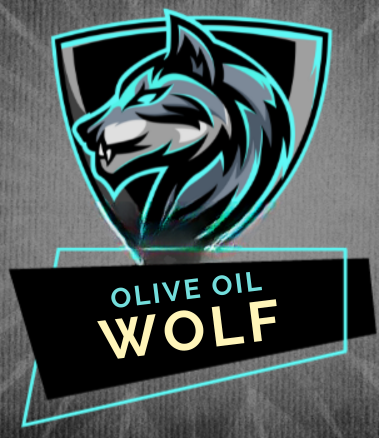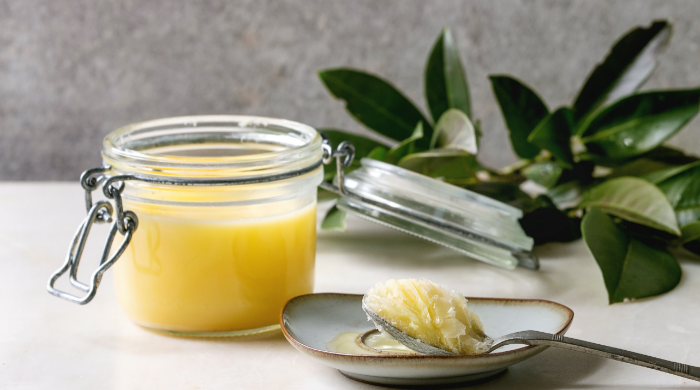Two popular contenders often find themselves in a culinary showdown: ghee and extra virgin olive oil. These kitchen staples have been used for centuries, each offering its unique flavor and potential health benefits.
In this article, we will look into what ghee is, explore its health benefits, and compare it to extra virgin olive oil to help you make an informed choice for your cooking and dietary needs.
What is Ghee?
Let’s start with the basics. Ghee, often referred to as “clarified butter,” is a traditional cooking fat originating from the Indian subcontinent. It is made by simmering butter to remove water and milk solids, leaving behind a pure, golden-yellow, fragrant fat. The result is a versatile cooking oil with a rich, nutty flavor and a high smoke point, making it an excellent choice for frying, sautéing, and even baking.
The Health Benefits of Ghee
- Rich in Healthy Fats: Ghee primarily consists of saturated fats and monounsaturated fats, which are considered heart-healthy when consumed in moderation. Saturated fats in ghee can increase high-density lipoprotein (HDL or “good”) cholesterol levels in the blood.
- Lactose and Casein-Free: During the clarification process, ghee’s milk solids are removed, making it virtually lactose and casein-free. This makes it suitable for individuals with lactose intolerance or milk allergies.
- Rich in Fat-Soluble Vitamins: Ghee is a source of fat-soluble vitamins A, D, E, and K, which are essential for various bodily functions, including immune support, bone health, and skin health.
- Contains Conjugated Linoleic Acid (CLA): Ghee contains CLA, a type of fatty acid that has been associated with various health benefits, including reduced inflammation and improved body composition.
- Promotes Digestion: Ayurvedic medicine has long touted ghee as a digestive aid. It is believed to stimulate the secretion of stomach acids, aiding in the digestion of food.
- Boosts Brain Health: Ghee contains butyric acid, which has been linked to improved cognitive function and may help protect against neurodegenerative diseases.
Extra Virgin Olive Oil: The Mediterranean Elixir
Extra virgin olive oil (EVOO) is the purest and highest quality form of olive oil, obtained by mechanically pressing olives without the use of heat or chemicals. It is renowned for its robust flavor, distinct aroma, and rich color, varying from golden to green, depending on the olives and production methods.
The Health Benefits of Extra Virgin Olive Oil
- Heart Health: EVOO is a cornerstone of the Mediterranean diet, which is associated with reduced heart disease risk. It is rich in monounsaturated fats, particularly oleic acid, which can help reduce bad cholesterol levels and lower the risk of cardiovascular disease.
- Anti-Inflammatory Properties: EVOO contains antioxidants, such as polyphenols, that have potent anti-inflammatory effects. These compounds may help protect against chronic diseases associated with inflammation.
- Rich in Antioxidants: The polyphenols in EVOO act as antioxidants, protecting cells from oxidative damage. This may contribute to its potential to reduce the risk of certain cancers.
- Blood Sugar Control: Some studies suggest that EVOO can improve blood sugar control and insulin sensitivity, which is beneficial for individuals with or at risk of type 2 diabetes.
- Brain Health: The monounsaturated fats in EVOO may support cognitive function and reduce the risk of cognitive decline and neurodegenerative diseases.
Ghee vs. Extra Virgin Olive Oil: A Healthy Showdown
Now that we’ve explored the individual health benefits of ghee and extra virgin olive oil, let’s compare them side by side:
1. Fat Composition: Ghee primarily contains saturated fats and monounsaturated fats, while EVOO is predominantly composed of monounsaturated fats. While both can be part of a healthy diet, EVOO’s monounsaturated fats have been extensively studied for their heart-protective properties.
2. Smoke Point: Ghee has a higher smoke point (approximately 450°F or 232°C) than EVOO (approximately 375°F or 190°C). This makes ghee a better choice for high-heat cooking methods like frying, whereas EVOO is best suited for lower-temperature cooking or as a finishing oil.
Refined olive oil can match or exceed ghee’s smoke point; however refined olive oil lacks the health benefits and flavor of extra virgin olive oil.
3. Lactose and Casein Content: Ghee is virtually lactose and casein-free due to the clarification process, making it a safer option for those with dairy sensitivities. In contrast, EVOO is entirely dairy-free.
4. Flavor Profile: Ghee’s rich, nutty flavor can enhance the taste of Indian, Middle Eastern, and South Asian dishes. EVOO’s robust, fruity, and slightly bitter flavor complements Mediterranean and European cuisines.
5. Antioxidant Content: Both ghee and EVOO contain antioxidants, but EVOO’s polyphenol content gives it an edge in terms of anti-inflammatory and cell-protective properties.
In the duel of health benefits between ghee and extra virgin olive oil, both contenders have their strengths and can be part of a balanced diet. The choice ultimately depends on your culinary preferences, dietary restrictions, and cooking needs.
If you’re seeking a high-heat cooking oil with a rich, nutty flavor, ghee is an excellent choice, especially if you’re lactose intolerant. It offers potential benefits for digestion, brain health, and providing essential fat-soluble vitamins.
On the other hand, if you’re looking for a heart-healthy cooking oil with a robust flavor, extra virgin olive oil shines. It is renowned for its cardiovascular benefits, anti-inflammatory properties, and potential for blood sugar control. EVOO is dairy free.
Ultimately, a balanced diet can incorporate both ghee and extra virgin olive oil, using each for its unique flavor and healthful properties.
So, whether you’re whipping up an Indian curry with ghee or drizzling EVOO over a fresh Mediterranean salad, both of these kitchen staples have a well-deserved place in your pantry.
Enjoy the delicious and healthful journey of exploring these culinary treasures!
Please leave comments, questions or suggestions below.
Tom – Olive Oil Lover


